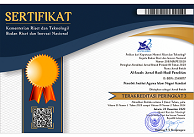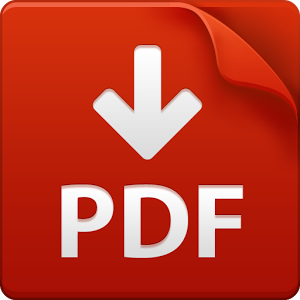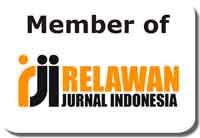Fikih Lingkungan: Revitalisasi Pengelolaan Sampah di Kota Kendari
Abstract
This study aims to provide a database of waste distribution patterns and describe paradigm variants in waste processing in Kendari City and hack acceptance of environmental jurisprudence as a theological approach in the practical practice of waste control. Root cause identification and precision analysis in the form of management area surveys, observation and sorting of waste materials, in-depth interviews, and aerial photographs (UAVs). The results showed that the pattern of waste distribution in Kendari City was measured through education level, income level, number of members in the KK, and type of work affecting the large volume of waste disposal and waste dominated by food waste and waste. Consumptive behavior describes a practical and pragmatic perspective seen in the behavior of people who use disposable materials and dispose of garbage instead of in landfills, which results in many wastes generation points. The Muslim community of Kendari City has not fully understood and realized the consequences of Islamic law related to environmental pollution. The review of environmental jurisprudence is expressly in the provisions of the law that it is mandatory to preserve the environment and that it is legally illegal to dispose of garbage in any place. Optimization can be reaped by actively implementing the Kendari City government as a service provider by preparing infrastructure for organik and inorganic waste management and providing counseling on the benefits of waste management. The participation of the community begins with understanding and theological awareness related to aspects of behavior, operational techniques, and environmental sustainability by practicing the 5R's towards Kendari City Zero Waste Home.
Keywords
Full Text:
PDFReferences
Al-Qurtubi, Abu Abdillah al-Anshari. Al-Jami’ Li Ahkam Al-Qur’an. VII. Kairo: Dar al-Kutub al-‘Arabi, 1967.
Al-Razi, Fakhruddin. “Al-Tafsīr Al-Kabīr/Mafatih Al-Ghaib.” In Tafsīr Al-Fahri Al-Rāzi, 139. Baerut: Dar al-Fikr, 1995.
Asy-Syatibi. “Al-Muwafaqat.” In Al-Muwafaqat, I., 20. Kairo: Darul Ibni ’Affan, 1997.
Eriksson, M. “Quantification Of Food Waste In Public Catering Services – A Case Study From A Swedish Municipality.” Waste Management 61 (2017): 415–22. doi:10.1016/j.wasman.2017.01.035.
Fernández-González, J M. “Economic and Environmental Review of Waste-to-Energy Systems for Municipal Solid Waste Management in Medium and Small Municipalities.” Waste Management 67 (2017): 360–74. doi:10.1016/j.wasman.2017.05.003.
Grazhdani, D. “Assessing The Variables Affecting On The Rate Of Solid Waste Generation And Recycling: An Empirical Analysis In Prespa Park.” Waste Management 48 (2016): 3–13. doi:10.1016/j.wasman.2015.09.028.
HWH Environmental. “Hazardous Waste Statistics to Know in 2022.” HWH Environmental, 2022. https://www.hwhenvironmental.com.
Khalid, F M. “Exploring Environmental Ethics in Islam.” The Wiley Blackwell Companion to Religion and …, 2017. https://onlinelibrary.wiley.com/doi/pdf/10.1002/9781118465523#page=159.
Lesmana, Rudy Yoga. “Estimasi Laju Timbulan Sampah Dan Kebutuhan Landfill Periode 2018-2027 (Studi Kasus Kec. Mentawa Baru Ketapang, Kab. Kotawaringin Timur, Kalimantan Tengah).” Media Ilmiah Teknik Lingkungan 2, no. 2 (August 2017): 20–24. doi:10.33084/mitl.v2i2.124.
Ma, J. “Exploring Social Dimensions of Municipal Solid Waste Management around the Globe – A Systematic Literature Review.” Waste Management 56 (2016): 3–12. doi:10.1016/j.wasman.2016.06.041.
Majelis Ulama Indonesia. Fatwa Majelis Ulama Indonesia Nomor 41 Tahun 2014 tentang Pengelolaan Sampah untuk Mencegah Kerusakan Lingkungan (2014).
Rosnawati, Wa Ode, Bahtiar Bahtiar, and Hasna Ahmad. “Pengelolaan Sampah Rumah Tangga Masyarakat Pemukiman Atas Laut Di Kecamatan Kota Ternate.” Techno: Jurnal Penelitian 6, no. 02 (January 2018): 48. doi:10.33387/tk.v6i02.569.
Salam, Izzuddin Ibn Abdis. Qawaidul Ahkam Fi Masholihil Anam. II. Beirut: Darul Kutubil Ilmiyah, n.d.
Samsu. “Solidaritas Sosial Pedagang Kaki Lima Di Paddy ’s Market Lawata Kota Kendari” 9, no. 2 (2014): 193–205.
Sudirman, Faturachman Alputra, and Phradiansah Phradiansah. “Tinjauan Implementasi Pembangunan Berkelanjutan: Pengelolaan Sampah Kota Kendari.” Jurnal Sosial Politik 5, no. 2 (2019): 291. doi:10.22219/sospol.v5i2.9821.
Yaqub, A. “Fikih Lingkungan Dalam Peta Pembangunan Nasional.” Bilancia: Jurnal Studi Ilmu Syariah Dan Hukum, 2017. https://www.jurnal.iainpalu.ac.id/index.php/blc/article/download/297/215.
DOI: http://dx.doi.org/10.31332/ai.v0i0.3339
Copyright (c) 2022 Andi Yaqub, Fatihani Baso

This work is licensed under a Creative Commons Attribution-NonCommercial-ShareAlike 4.0 International License.










